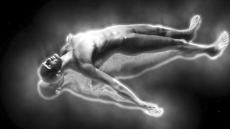Patients suffering from neurological or psychiatric conditions have often reported feeling a strange “feeling of a presence” (FoP) phenomenon. Now, Swiss researchers have succeeded in recreating this so-called ghost illusion in the laboratory.
The team at Ecole Polytechnique Federale de Lausanne (EPFL) showed that the “feeling of a presence” actually results from an alteration of sensorimotor brain signals - involved in generating self-awareness by integrating information from our movements and our body's position in space.
“Our experiment induced the sensation of a foreign presence in the lab for the first time. It shows that it can arise under normal conditions, simply through conflicting sensory-motor signals,” explained co-researcher Olaf Blanke.
The robotic system mimics the sensations of some patients with mental disorders or of healthy individuals under extreme circumstances.
“This confirms that it is caused by an altered perception of their own bodies in the brain,” Blanke noted.
During the experiment, Blanke's team interfered with the sensorimotor input of participants in such a way that their brains no longer identified such signals as belonging to their own body, but instead interpreted them as those of someone else.
The researchers first analysed the brains of 12 patients with neurological disorders - mostly epilepsy - who have experienced this kind of “apparition”.
MRI analysis of the patients's brains revealed interference with three regions involved in self-awareness, movement and the sense of position in space.
The scientists then blindfolded participants who performed movements with their hand in front of their body.
Behind them, a robotic device reproduced their movements, touching them on the back in real time.
Next, the team introduced a temporal delay between the participant's movement and the robot's touch.
Under these conditions - distorting temporal and spatial perception - the researchers were able to recreate the ghost illusion.
After about three minutes of the delayed touching, researchers asked participants what they felt.
Instinctively, several of them reported a strong “feeling of a presence” even counting up to four “ghosts” where none existed.
“For some, the feeling was even so strong that they asked to stop the experiment,” said lead researcher Giulio Rognini.
It is unlikely that these findings will stop anyone from believing in ghosts.
However, “the experiment shows they only exist in our minds”, researchers concluded in the study that has been published in the journal Current Biology.





